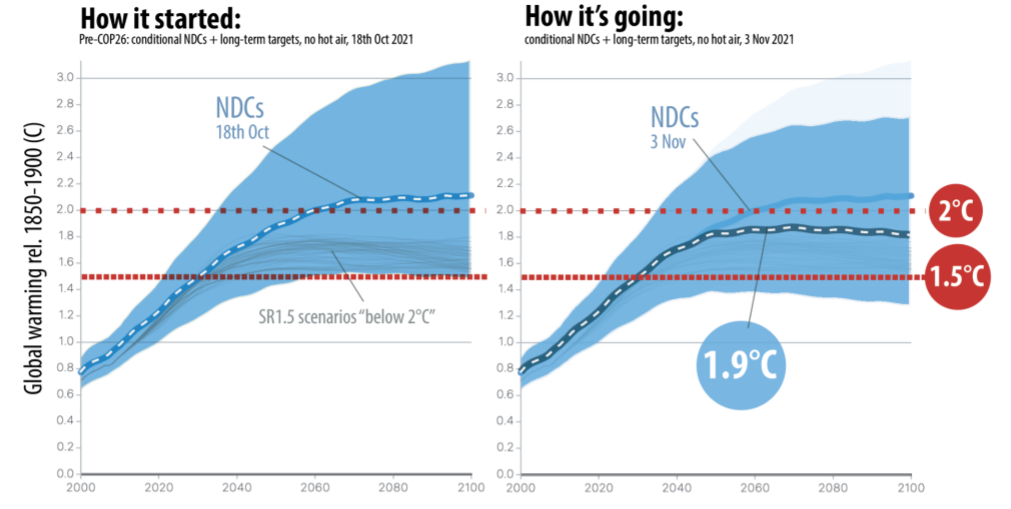Cop26 pledges could limit global heating to below 2C for the first time, snap analysis finds
The ‘huge’ unknown is whether countries will stick to their latest climate promises, analysis author tells The Independent
Your support helps us to tell the story
From reproductive rights to climate change to Big Tech, The Independent is on the ground when the story is developing. Whether it's investigating the financials of Elon Musk's pro-Trump PAC or producing our latest documentary, 'The A Word', which shines a light on the American women fighting for reproductive rights, we know how important it is to parse out the facts from the messaging.
At such a critical moment in US history, we need reporters on the ground. Your donation allows us to keep sending journalists to speak to both sides of the story.
The Independent is trusted by Americans across the entire political spectrum. And unlike many other quality news outlets, we choose not to lock Americans out of our reporting and analysis with paywalls. We believe quality journalism should be available to everyone, paid for by those who can afford it.
Your support makes all the difference.Pledges put forward at the Cop26 climate summit, including a surprise announcement from India, could put the world on track for under 2C of global heating for the first time.
While a UN review published ahead of Cop26 found that countries’ climate commitments would cause around 2.7C of global heating, far above the Paris goals, the new assessment says that, if kept, new short and long-term climate promises put forward in recent weeks and during the summit itself could keep temperatures to 1.9C.
“We analysed the [climate pledges] of 96 countries, including the very last one that came through, which was Argentina,” Professor Malte Meinshausen, a climate researcher at the University of Melbourne and an Intergovernmental Panel on Climate Change (IPCC) scientist, told The Independent.
“Assuming these pledges are actually fulfilled, our best estimate is that we are at peak warming of 1.9C this century. The huge, huge ‘if’ here is if countries’ [climate pledges] are met, if they are implemented with actual domestic policies.
“The other caveat is that, in order to get closer to 1.5C, there is no way other than to substantially increase emission reductions this decade. The 2050 targets are good and bring us so far, but to get to 1.5C, we really need stronger 2030 targets.”

A representative for the world’s least developed countries made it clear on Wednesday that securing the action needed to keep temperatures at 1.5C remains a top priority at the conference.
Sonam Phuntsho Wangdi, chair of the least developed countries group, told a press conference held on Wednesday: “Our lives depend on decisions that are made here in Glasgow during Cop26. So far the progress here is disappointing and in a way almost frightening.”
The new analysis, conducted by the Climate Resource initiative, considers countries’ short-term climate pledges, known as “nationally determined contributions” (NDCs), as well as net zero targets. It assumes that countries stick to the more “optimistic end” of their NDCs.
India stole the limelight at Cop26 on Monday when President Modi committed the country – the world’s third largest annual emitter – to net zero by 2070, and strengthened short-term targets.
A recent landmark assessment from the IPCC found that global emissions must fall by around half by 2030 and reach net zero by 2050 if the world is to limit warming to 1.5C.
“Net zero” is the point at which the amount of greenhouse gases that humans release into the atmosphere is balanced by the amount they are able to remove.
Climate Resource is one of several independent research initiatives that track how countries’ emissions pledges could impact global temperature rises this century.
Professor Piers Forster, founding director of the Priestley International Centre for Climate at the University of Leeds, said the figures appear to match his team’s own calculations. “Cop26 has moved the dial on targets, it now needs to move the targets on delivery,” he told The Independent.
He said it is worth bearing in mind that some climate commitments put forward by countries are still vague, which could impact the level of warming.
“There are also data limitations: We don’t know the emissions from deforestation at all well, only the net land-use emissions,” he added.
Dr Zeke Hausfather, a climate scientist and energy systems analyst at the Breakthrough Institute in California, agreed that the projections “seemed reasonable”.
“The challenge is that long-term net zero commitments are doing all the heavy lifting here,” he told The Independent.
“2030 NDCs alone still likely put us on track for around 2.5C warming. It’s easy for countries to pledge to do something in 30 to 50 years; the real test of how seriously we should take these commitments is the extent to which they are reflected in enhanced near-term ambition.”

Join our commenting forum
Join thought-provoking conversations, follow other Independent readers and see their replies
Comments